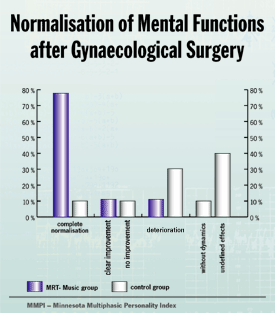The evaluation of the mental state of the patients was gained by the help of the Minnesota Multiphasic Personality Inventory.
It became obvious that the initial patient profiles showed great differences: from normal states up to obvious psychopathic disorders, where the peak profile values even reached 90 t-points.
The average initial profile of the patients was characterized by
- the creation of emotionally
disturbed ideas concerning
the disease
- the inclination to a twisted
interpretation of the disease
(raising the scale 6,8,1) as well as
- the tendency to take refuge in
the disease (which became clear
through the configuration of the
neurotic scale as converse 5)
4 women were treated with Medical Resonance Therapy Music® 2-3 times before surgery and for twelve days after surgery, 1-2 times per day, each time for 30-60 minutes in addition to a conventional treatment with antibiotics, vitamin preparations, anodyne drugs and a disintoxication therapy as well as a physiotherapy. In difference to the control group these women did not receive sedative drugs before and after surgery.
By the treatment with the Medical Resonance Therapy Music® within the context of the complex therapy great changes in the mental profile took place:
- in 77,8% of the factors a complete normalization established
- in 11,1% of the factors a significant improvement became evident
- in 11,1% of the factors a
deterioration occurred
Improvement of mood
69% of the reports showed a significant improvement in mood and reported a feeling of an internal uplifting of the spirits.
In this group 14 women received the conventional treatment only, not listening to Medical Resonance Therapy Music®. Before surgery they received sedative drugs and after surgery they received the conventional treatment. In difference to the experimental group the women here were treated also with sedative drugs after surgery in order to treat their sleep disorders.
By the treatment with the conventional therapies the following changes in the mental profile of the patients took place:
- in 10% of the factors a complete
normalization established
- 10% of the factors did not improve
- 20% of the factors worsened 10%
worsened predominantly
- 10% remained without dynamics
- 40% showed undefined effects
Improvement of Mood
Mood improved only in 18% of the women and this only shortly before leaving the hospital.
Investigators:
Prof. Dr. med. G. Gerassimowitsch
Prof. Dr. med. Walentina Sidorenko
Dr. med. Anna Kuptschina
Dr. med. Tatjana Teterkina
Dr. med. Sergej Korotkow
